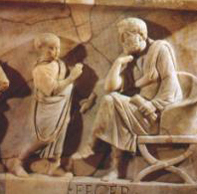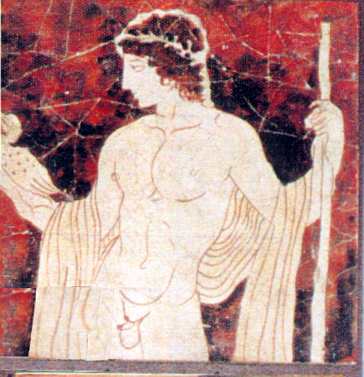 |
 Introduction |
PREAMBLE.
The first encounter with the classical languages always occurs on educational reasons. Actually, it is improbable that a boy is eager to learn Latin[1] or Greek.[2] Even the study of a modern foreign language, which in Italy begins with the intermediate school, rarely responds to an intimate desire. It happens, however, that an unwanted encounter can give birth to an unexpected passion. Well, these pages apply to all people, who, beyond their own educational or professional run, are fascinated by the classical languages in itself.
The study of a language, in general, and of the classical languages, in particular, refines our thinking and, therefore, our way to express ourselves; then, by introducing us to new and different way of thinking, reflecting, and evaluating, sharpens our wits and expands our consciousness.
Each language is, first of all, a structured system of sounds, whose written representation is nothing but a symbolic one, i.e. different and forcedly incomplete, just as incomplete is any musical score. Ex.gr., the graphic symbols, or letters, which draw the concept of “casa”, are fully intelligible and can be correctly voiced only by those who think and speak in Italian, as well as the symbols that make up the word “house” are fully intelligible and can be correctly voiced only by those who think and speak in English. You cannot learn a language if you cannot utter by sounds its graphical representation, i.e. if you are not able to speak it, because the core of a language is not in the signs representing its sounds, but the sounds themselves. This is also true for the classical languages. Hence, we will expose our considerations about the correct Latin and Greek pronunciation in a separate article.
Here, we only want to propose our advice on how and what should be studied to learn the classical languages ??without wasting time. Try asking a university student of classics to translate into ??Latin or Greek the following sentence: "Good evening, teacher, may I ask you a question?" Well, you will put him into trouble. Now, what would you say on an Italian student who, after nine-year course of English, taught by titled regular professors, were not even able to translate at sight a simple sentence like that quoted above? Probably you would say that student is mentally deficient. Yes-we might add-but no more than the teachers who, one after another, have promoted him and graduated!
As for our studies, if we had had good advice and good manuals at our disposal, our knowledge of the classical languages would be quite different now!
Here, therefore, the primary purpose of these pages: to give good advice to all those people who want to be addressed properly and avoid losing years studying errors given by incompetent teachers and their manuals. As for ministerial programs, and the opinion of this or that renowned professor, and the bibliographic flood, which updates the academic publications in order to confuse and distract, we do not care a hoot.
When someone tells you he is studying a foreign language, he would not like to make it clear that he is referring to this or that “spoken” language, of course. So, a foreigner who is going to study Italian will be offered a course or a manual explaining the spoken language. Well, no teacher will dream, or should dream, of including in the exercises indiscriminate sentences from Boccaccio, Fogazzaro, Machiavelli, Leopardi, Vico, Tommaseo, Petrarch, etc. Why? Because these authors belong to different times and, therefore, use a different vocabulary, different syntactic structures, even a different morphology and spelling. For dealing with such a difficulties one needs to be even much more prepared than many professors of Arts. Let us suppose for argument's sake that an Italian teacher decides to submit such exercises to his foreign students; well, he will cause so much confusion, so much mess, so much bewilderment in the mind of those boys, that he will wholly endanger their ability to understand and be understood!
On the contrary, this absurd approach is the usual one for teaching Latin and Greek. And not just in Italy! Among quotations (often wrongly altered) from Cicero and Caesar you find sentences from Ennius, Eutropius, Tacitus, Pliny, Valerius Maximus, Gellius, Seneca, Macrobius, Petronius, St. Augustine, etc. Likewise, among Xenophon, Plato and Isocrates, you can find Dio Chrysostom, Plutarch, Lucian, Herodotus, Polybius, Origen, etc.
A method like this will not turn out to be useful for learning Latin or Greek, but it will pour out a Latin or Greek frappe inside the brains of students, who no longer will be able to distinguish one author from another, since the mixture of which are drenched, contains and mixes any favour or fragrance. Somewhere we read that "does not exist the Latin language, but the Latin of Cicero; that of Cicero as orator, teacher of rhetoric, and 'philosopher'; there is the language of Caesar, Livy, Tacitus ... ".[3] It would be like saying that the Italian language we are talking in our time does not exist, because there is only the language of this or that author. It is undeniable, however, that not only on the market, at school, and at home, but generally on periodicals, and publications, too, people speak and write an Italian increasingly resembling a pile of rubble. Sometimes you get the impression that the speaker or writer does not even know what he wants to write or say. Hence, any misunderstanding often arises not from differences of opinion, but because of inability to communicate it. The boys are hardly able even to articulate certain sounds. It is the result of both demagogic and ravaging school reforms.
We will not propose systematic treatises, but, within the limits of our knowledge, of course, we will deal from time to time with a syntactic construct, lexical issues and other questions, with the primary intent of reporting those mistakes a scholastic, disastrous, and misleading tradition turned into rules accepted without batting an eyelid.
____________________
[1] By the word Latin, unless specifically stated, we mean the Latin language during the period of its greatest coherence and richness, as it is documented by Cicero, Caesar, Sallust and Varro, to whom, but with caution, we can add Cornelius Nepos. We exclude, however, Livy, although born in 59 B. C., because in his prose was already operating that inescapable process of transformation that, by crumbling of syntactic constructs and aberrations in the use of vocabulary, reshapes the languages. So, the language of Livy may not be considered as belonging to classical Latinity, like scholars and philologists usually do.
[2] With Greek, unless otherwise stated, we mean the Greek as written by Xenophon, Plato, Isocrates, Lysias, Iseus, and Andocides, whose writings represent the acme of the ancient Greek. To these authors we could also add Herodotus, Hippocrates, Antiphon and Thucydides, whose prose documents the nearest previous stage of the language. The contemporary inscriptions should be added too, but the collections of inscriptions not only were compiled on a geographical, not synchronic, principle, but also the texts were edited using the standard Greek alphabet, entirely improper, so that their exploitation to our purpose is almost impossible.
[3] Cf. A. Colombo, Graecorum scripta in Latinum conversa, Milano (I.S.U) 1999, p. 12s.
 De lingua et Graeca et Latina |
 Varia et diversa |
![]()
Home | De lingua et Graeca et Latina | Varia et diversa | e-mail